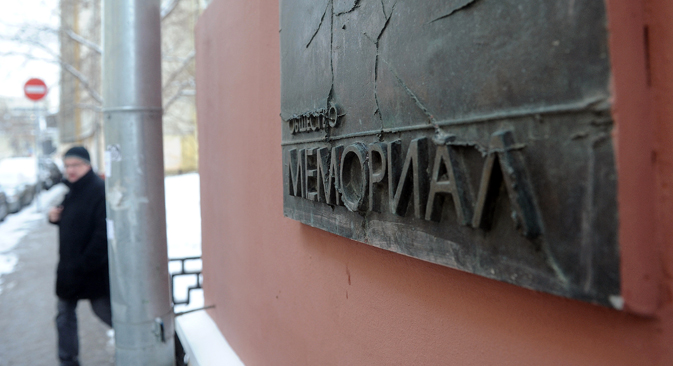
Memorial office in Moscow. Source: Kirill Kallinnikov / RIA Novosti
The Russian Supreme Court has dismissed a Justice Ministry lawsuit demanding the closure of Russia’s oldest human rights society, Memorial. The ministry acknowledged during the hearings on Jan. 28 that the NGO had addressed all its complaints, but still refused to drop the lawsuit.
Memorial is a human rights, charitable, and historical and educational organization that was registered in the Soviet Union in 1989. Its first chairman was scientist and human rights activist Andrei Sakharov. Memorial’s key areas of expertise are human rights, education, and research into the history of political repression. Memorial International unites dozens of organizations in Russia, Armenia, Germany, Georgia, Kazakhstan, Latvia, and Ukraine.
The Justice Ministry took up issue with the NGO, officially called Memorial: A Russian Historical, Educational, Human Rights, and Charitable Society, last fall. The complaints had to do with the way Memorial is structured and with its reporting and operations.
The Justice Ministry was unhappy with the NGO’s lack of a clear vertical structure. Memorial, which was established more than two decades ago, unites various organizations that conduct charitable, human rights, and historical and cultural work. The ministry also insisted that the head office’s activities figure in Memorial’s reporting, while the NGO claimed that that work is performed in its regional divisions.
In the end, Memorial made all the required changes to its charter and submitted the new document to the Justice Ministry. At court on Jan. 28, a ministry spokesman admitted that the organization had indeed addressed all of the complaints.
Ministry still not satisfied
The Supreme Court’s ruling addresses the Justice Ministry’s complaints against the Russian Memorial, but now the ministry has taken issue with the International Memorial Society, which is closely associated with the Russian division and brings together human rights activists from Russia, Germany, Kazakhstan, Latvia, and other countries.
In this case, the litigation with the Justice Ministry is only just beginning, Memorial International’s chairman Arseny Roginsky told RBTH. At this point, it is not yet clear what the Justice Ministry is dissatisfied with, he said, adding that Memorial’s lawyers will handle the demands imposed by the ministry.
Roginsky said he was not surprised by the Supreme Court’s decision, even though lower courts had ruled in the ministry’s favor. In the past two weeks, the Memorial chief said he had had the feeling that the Justice Ministry would not be pleased.
In an interview with RBTH, Deputy Director of Human Rights Watch Moscow Tatyana Lokshina called the Supreme Court’s ruling a “major victory,” noting the importance of the support offered to Memorial during the proceedings. Russia’s Human Rights Ombudsman Ella Pamfilova stood up for Memorial, and the European Parliament also expressed its support for the NGO.
The position of the authorities
Observers were struck by the abnormality of the situation that unfolded at the Supreme Court on Jan. 28. Despite recognizing that Memorial had fulfilled its demands by making all the required changes to its charter documentation, the Justice Ministry still pushed forward with its lawsuit.
Some media outlets suggested that the ministry’s approach indicated a broader tendency on the part of the authorities to tighten the leash on independent human rights organizations.
Meanwhile, Roginsky said there could be two reasons for the ministry’s desire to continue with the lawsuit. Firstly, a fear of responsibility could have a role to play – the ministry originally filed the lawsuit because of problems with the NGO’s charter. Secondly, the Justice Ministry might simply be holding onto the possibility of appealing against the ruling.
Roginsky said he was not inclined to see any underlying political reason caused by the authorities’ desire to try and pull the plug on Memorial’s activities.
Director of the Political Science Department at the Information Science for Democracy (INDEM) Foundation Yury Korgunyuk has a different opinion. According to him, the authorities want to curtail the operations of independent NGOs and are unlikely to leave them alone.
However, Igor Bunin, who heads the pro-government Center for Political Technologies Foundation, shared Roginsky’s assessment of the situation. In his opinion, the authorities are not looking to bar Memorial from operating and have no desire to close Russia’s oldest human rights organization.
All rights reserved by Rossiyskaya Gazeta.
Subscribe
to our newsletter!
Get the week's best stories straight to your inbox